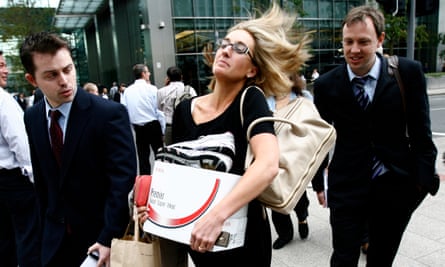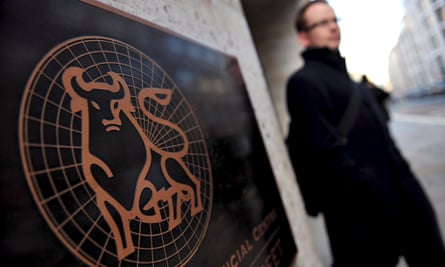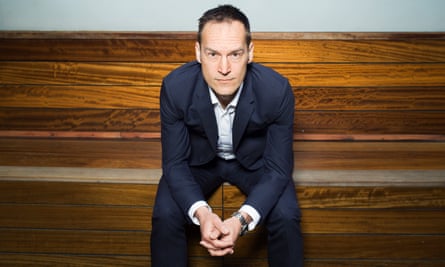In 2009, shortly after the global markets had suffered their worst crisis for 90 years, Alexis Stenfors was working as a currency trader for Merrill Lynch in London. With 15 years’ experience, he was good at his job and he prided himself on his ability to read the markets. His view was that the whole financial system was going to go “belly up”. That was what he was betting on.
And boy did he bet. He took increasingly extreme positions and when they failed to return dividends, he covered up losses in his trading books that he estimated to be around $100m (£78m). Then he went on holiday to India. Stenfors didn’t realise it at the time, but it was the end of his career as a trader, and the beginning of his notoriety as a rogue trader. Merrill Lynch later announced that his actions had resulted in the loss of $456m (£356m).
He lost his job, the media left his reputation in tatters and he was banned from the City for five years. Now he has written Barometer of Fear, a book about his experiences. Or rather, he has written a book that touches on his experience, but is rather more concerned with institutional wrongdoing, such as the Libor scandal. It’s a strange confession-cum-critique in which the author still seems unable to explain his own role.
One chapter, quoting the question that has often been put to him, is titled: “Why did you do it?” At the end of it, having not said much about his motivations, he writes that, despite seeing a psychiatrist for two years: “I am not sure if I have come any closer to a definitive answer to the question.”
When discussing banking flaws he can be authoritative, but about himself he appears detached, incurious, even alienated. Yet the man I meet at SOAS, University of London, is far more open than his prose.
Stenfors is originally from Finland, part of the small Swedish-speaking minority. He says that this made him feel different to the crowd. As a young boy, he developed a fascination with foreign currencies, collecting coins and making lists of their value. It was an interest, he says, that led him to go into banking, working as an intern at Dresdner bank in Germany in the early 90s. And it would lead him to London, on to Japan and then back to London again, the scene of his downfall.

He once told a journalist that, as a young man in Finland, he had used the name Patrick Bateman to book squash courts. Bateman is the New York trader and homicidal psychopath in Bret Easton Ellis’s novel, American Psycho, a book Stenfors had enjoyed. It was a joke, but apparently that was the extent of evidence in Stenfors’s blameless background that he might one day dabble in infamy.
He describes an affluent but pressurised life as a trader, with huge financial rewards but little opportunity to do anything with them. He also writes of a ruthless managerial approach. One boss suggested that Stenfors’s wife Maria should be induced when she was having a troublesome pregnancy, to save Stenfors having to take time off. On another occasion, his request for leave to visit his sick father was turned down, and his father died before he could get to him. But none of this lessened his dedication to the job.
Now a lean 46-year-old academic, he looks relaxed in a dark suit and open-necked shirt. His short dark hair is untroubled by grey. He lives with Maria and their two children in central London. Unlike some other notable rogue traders, Stenfors never came close to being sent to prison. Why?
“There was never a criminal investigation, or even a hint that it could be criminal,” he says.
Initially he was angry that he had been grouped with the likes of Nick Leeson, the trader who brought down Barings Bank. But couldn’t his deceit, deliberately mismarking his books, be seen as a kind of fraud? “I think you would have to ask a lawyer,” he says. “First of all, the process of valuing a book, we did it ourselves as the traders. Looking back, how on earth can you have such a set up?”
Good question. Perhaps the most shocking element of Stenfors’s new book is that it confirms that the economic crisis, which was effectively created by the banks, did very little to make the banks address their bad habits. Merrill Lynch, for example, had to be bailed out by the Bank of America in what amounted to a buyout. On New Year’s Eve 2008, the day before the deal went through, Merrill Lynch brought forward its bonus payments by several months and lavished them on staff. Once the deal was complete, Merrill Lynch announced it had just lost $13.8bn (£10.7bn) in the previous three months. Stenfors says that this manoeuvre made him feel “sick”.
“I had this feeling that there was something really wrong with the system,” he says, and notes that the problems have continued with the massive Libor and foreign currency manipulations.
But it didn’t stop him from making wild bets in a desperate effort to make money for a bank that had played an instrumental role in the complex junk trades that helped bring about the crisis. “I didn’t have the capability to think about the system as a whole,” he says. “It was like working in a nuclear reactor. You’re so busy working on pipes here and there, you don’t get to go outside and say: ‘Hang on, what happens if the whole things explodes?’”

Except that was exactly what Stenfors was gambling on. None of it makes sense, but he describes a kind of intense social isolation dominated by work. He didn’t really see anyone who wasn’t involved in finance, other than his wife and their two children. Inside the bubble, all that mattered was winning. It didn’t matter if the price of the victory was the demise of everything else.
And that seemed to be enough to quell any doubts he may have had. Stenfors describes himself as someone whose political sympathies have always been on the left. But he also recalls an occasion when he was told by a manager to sack a Japanese trader whose healthy profits were not steep enough for the company’s liking. He did as he was told.
“Where do you draw the line between the morals of the bank and the morals you hold yourself?” he writes. “Should any such line be drawn at all?” I’m astonished by this question, which seems a total abnegation of personal responsibility. Can he really be so ambivalent?
“I think it’s very clear that you should follow your own morals in this sense, and that’s what I wish I had done much earlier,” he says. “But it’s very easy for me to say: ‘Follow your own morals and it will be fine.’ But it won’t be fine. Because if you break the rules and conventions, you’ll begin to run into trouble.” He talks about not being invited to drinks parties, and being denied the trading book you desired or getting a smaller bonus. All of which makes it sound as if it’s pretty easy for the banking culture to maintain immoral practices.
I ask Stenfors how much money he was earning at his peak. “I don’t want to say,” he replies. I push him several times, because I want to know how much money corrupts, and how much is enough to enable someone to walk away. Eventually, he says that in 2008 he earned “a seven-figure sum”. However, he argues that money is not the issue, because you never have time to spend it. What motivated him, he says, was being right.
“You get these bonus cheques, but there’s no way you can use the money, only maybe when you retire. I’ve spoken to so many people over the years and all they want to do is open a pub in Cornwall. But they never do because they never have enough money.” At £1m and more a year, you wonder how much it costs to open a boozer.
But the point is that the more you earn, the more you believe you need to earn. For all his talk about not caring about money, Stenfors admits that it irked him if his bonus was not as large as he thought he deserved. Sometimes he made a lot of money for the bank, but the bank overall didn’t perform well, and he felt short-changed.
“Trading is very individualistic. You think you deserve this regardless of how the company as a whole is doing. It’s only me, me, me. I was extremely arrogant. But money in this sense isn’t necessarily about acquiring wealth. It’s more like you’ve won the race and you think you deserve the gold medal.”
Stenfors took a PhD in economics at SOAS after he left trading, or trading left him. He is now a senior lecturer in economics and finance at Portsmouth University. He has a wide range of friends, he says, and feels much happier.
I ask him if he felt his job as a trader was important. He did at the time, he says – he thought he played a vital role in helping global trade. But now he is not proud of the speculative element. “The betting was way too much. It was sort of like it started small and then it became so extremely large.”
But for all his apparent objection to speculation, I can see something in his eyes when he speaks about trading, a spark of excitement. He’s now eligible to apply for a licence again. Would he do it? “I miss the buzz and I follow the markets,” he says, “but I don’t think so.” He says he couldn’t do it without becoming obsessed again.
Does he miss the money? “Of course, it’s always easier to live if you have more money, but to go back to trading simply to make more money? No, I wouldn’t. I know that if I went back, I know what I would become.”
A risk-taker? In the book, he writes: “Although other people in the market probably saw me as a big risk-taker, I didn’t spend much time thinking about it – at least not until it was too late.”
“That was the only thing that I really liked,” he says now. “Without being a risk-taker, I would not even think about it. That was the thing I enjoyed.”
I think he should stick to lecturing.
The axeman cometh: an extract from Barometer of Fear
Early on I learned to accept that the rules of trading did not always apply to the rest of society or vice versa. Despite this, conventions within the dealing room felt logical and everybody seemed to accept them. In the absence of outside regulation, the banks simply wrote the rules themselves, which were then accepted by the rest of the market as well. The environment might not have been pleasant, fair or honest all the time – but even so I did not think of trading as immoral.
During the 1939-40 Winter War between Finland and the Soviet Union, the Finnish army had a sniper called Simo Häyhä. Having killed 505 soldiers in less than 100 days, he came to be nicknamed White Death by the Red Army. Some 40 years later, when Häyhä was asked whether he had any regrets about killing all those people, he answered: “I only did my duty, and what I was told to do, as well as I could.” Traders who showed no compassion for wounded competitors were sometimes also nicknamed “snipers”. Individuals who do their duty, what they are told to do, and as well as they can, are often considered perfect employees – no matter what their job description is.

I was once told by a manager to fire a Japanese employee in my team who had served the bank for two decades. The trader in question had done nothing wrong and had generated a stable revenue stream every year. But the trajectory was not steep enough and the trader had to go. I remember expressing unease about the assignment, not least because of the Japanese tradition of lifelong employment.
“Don’t worry,” I was told. “We can always suggest a cleaning job in Hokkaido.” I understood. Giving the trader the option of moving to another island of Japan would mean that the bank, technically speaking, still required the employee’s services. However, given that it would mean being humiliated in front of family and friends, the trader would never exercise that option. I did my duty.
Afterwards, some colleagues jokingly began to call me the Axeman. I hated the nickname, but thankfully did not have to perform any more such executions. Money probably does have a tendency to drive out morality.
Barometer of Fear by Alexis Stenfors is published by Zed Books at £9.99 on 15 May. To order a copy for £8.49, go to bookshop.theguardian.com

Comments (…)
Sign in or create your Guardian account to join the discussion